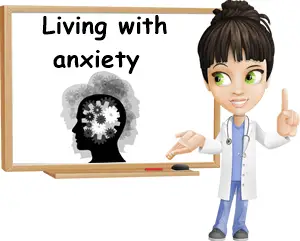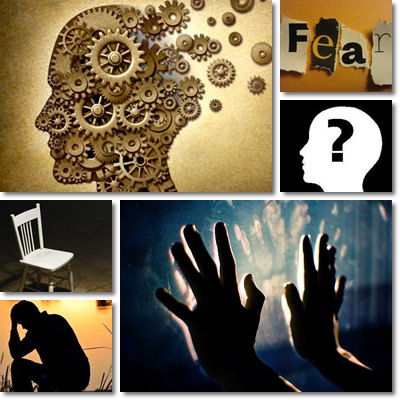The experience of anxiety is overwhelming and utterly discouraging, making living with it extremely challenging. The most challenging aspect of living with anxiety is the utter lack of control over what you think, feel and your reactions to those thoughts and feelings. It’s your mind, your body and your choice and yet you feel like you can’t do anything about the thoughts of fear and resulting feelings and behaviors that cripple you and the helplessness you experience when trying to break the vicious circle that is anxiety.
What living with anxiety does is slowly break you off from the real world and normal life by anchoring you in an excessively emotional state that nourishes obsessive thoughts and behaviors. In simpler words, you become more and more afraid of everything and it gets harder and harder to overcome your fears. And the continuance and permanence of fear eventually prevents you from functioning. Living with anxiety gives you the experience of fear and helplessness first hand.

What are the challenges of living with anxiety? Having anxiety basically means living in constant fear of what might happen, of everything that might happen. And living with fear every day is a difficult experience for anyone, irrespective of the extent of that fear. Anxiety is a very complex experience and understanding what a person with anxiety is going through and how to help them means understanding the nature of their illness and the challenges they face every single day. What makes anxiety worse is the fact that it is often belittled and reduced to a whim. But anxiety is a mental illness and not admitting it is challenging to deal with is counterproductive for every party involved. Read below and find out the 9 undeniable truths about anxiety and the challenges they pose.
1) It’s fear and it’s real. Anxiety is often regarded as a sign of a weak character, not a mental illness. This is because most people think that in order to feel fear, there must first be a real, valid, tangible, palpable trigger. But that trigger exists: it’s our own mind. It’s our mind that convinces us there is reason to fear something and just because we don’t give our brain the credit it deserves, it doesn’t mean it’s not as convincing as it actually is. After all, our brain is the one that shapes our reality and tells us how it looks, feels, sounds, tastes and smells like. That same brain tells us when there is danger and we all believe it and react accordingly.
The fear that is born inside our mind is just as real as the one that is born outside it and then shaped in it. It’s fear and it poses the same challenges for everybody. So telling someone with anxiety to get over it, as gentle as it may be put, does not usually help. Moreover, you have to be an incredibly strong person to live with sometimes paralyzing fear every day for long periods of time. Being understanding and empathizing with the situation is more likely to make anxiety sufferers more responsive and open to suggestions or accepting help.

2) It’s not just in your head. Anxiety starts off as a thought, be it worry, fear or uncertainty. That thought generates feelings in response and those feelings manifest through physical symptoms. For example, both generalized anxiety and phobias can have strong physical manifestations. When fear is great, the body prepares itself to react, to save itself from potential danger. These preparations may include our heartbeat getting faster and our heart starting to pound, mechanisms meant to supply more oxygenated blood to the muscles in case we need to run from danger. When blood resources concentrate on the muscles in our legs and arms, for example, there is less blood going to the brain and our stomach, hence the dizziness, lightheadedness and butterflies in the stomach sensation anxiety sufferers experience.
All of the body’s energy is redirected towards life-saving systems. For example, there is no need to produce saliva or digest food. By putting such processes second, we may get a dry mouth, dry throat, nausea or the need to have a bowel movement to relieve the digestive system of what is keeping it occupied and consuming energy. And these are just a few examples of the extent of the physical manifestations of anxiety.
3) You can’t stop the thoughts. Just because anxiety starts in the mind, with a thought, that doesn’t mean sufferers can just shut off those thoughts and get better. By their very nature, anxiety thoughts are obsessive, meaning they occur repeatedly and continually, even though you don’t want them to. Of course, the first reaction is to try to impose to yourself to stop obsessing over your fears, worries, insecurities. But whenever you try to stop yourself from thinking about something, you end up thinking about it obsessively. It would actually be more productive to not forbid yourself to stop thinking about something, but instead allow thoughts to come and go. Fixating on not thinking about something will make you think about it more than if you would have just thought about it and then the thought would have just gone away on its own.
4) It’s tiresome. Anxiety is also challenging because it’s tiresome. Imagine having to feel afraid all the time, making significant effort to avoid situations, places, people that make you feel uneasy or apprehensive, worrying about the possibility of having to face your fears or making up unfortunate scenarios in your mind all the time. All of this is draining, both emotionally and physically and it’s only natural to feel exhausted. And when you’re this tired, it’s only normal to not feel up to anything. By its very nature, anxiety is demanding and exhausting which should prompt us to be understanding of sufferers and give them time to feel ready to tackle their problems.
5) It’s crippling. Anxiety is all about fear. And fear is crippling, mentally and physically. It’s disabling. It stops you from functioning and scars you. With anxiety, there is always a battle inside you. You feel you’re at war with yourself. There is this rational part of you that is perfectly reasonable and understands what fear is, how it affects you and how you should respond to it.
And then there is this part of you that acts independently of your better judgement and wishes and makes you dwell on fears, worries, insecurities and dread the moment you might have to face your fears. This less rational part of you makes you want to avoid anything that might even remotely put you in the position to have to face your fears and display all of those crippling symptoms of anxiety, from fast heartbeat and pounding heart to lightheadedness, nausea, muscle tension or paralyzing fear.

6) It’s normal to not want to face your fears. When you are afraid of something, there will always be a thought in the back of your mind keeping that fear alive. There will always be a physical and emotional reaction when you are put in the position to face your fear. There will always be a scar left to remind you about that fear. And all of this makes you not want to face your fears, even though doing this might help you overcome them.
In my experience, this is okay. It’s normal because if you face your fears when you are not prepared, you will most likely learn nothing from the experience and only become more afraid, more anxious. But if you take some time to acknowledge that it might help you to tackle the causes of your anxiety and do this consciously, then you are more likely to benefit from the experience.
7) It makes you feel utterly helpless. Thoughts generate feelings and feelings produce the physical symptoms of anxiety in the form of certain behaviors. These behaviors further reinforce feelings and thoughts in an overwhelming vicious circle. When you don’t have control over your thoughts, feelings or reactions and don’t see how you can break this vicious circle because reactions generate feelings of anxiety which lead to thoughts in return, it may seem as if there is no solution.
This feeling of helplessness can make anxiety really bad and even can cause sufferers to turn down help or support from professionals and loved ones. But no matter how helpless you may feel, it’s good to remember that this is not permanent and that you still are in control of your decisions and there will come a time when you will feel confident enough to act on this control.
8) Shutting out people is not voluntary. Anxiety singles you out. It makes you compare yourself to others and their ability to just shrug off negative or obsessive thoughts and go on with their life. It makes you feel people are judging you thinking you are weak for not simply getting over your anxiety. It even makes you resent people, even those that genuinely want to help. Any intervention might feel like an intrusion into your life or a push. And this can lead to shutting out people, even those offering unconditional love and support.
This isn’t permanent either, but we do have to understand the reasoning behind loved ones trying to push us: they love us and may feel desperate they are losing us to something they don’t understand. With this in mind, it might help to let those around us know we may need a little time to process some things and that it would be helpful if they were patient and non-intrusive, if they allowed us to wait some things off, also reassuring them that when we need help or support, we will ask for them.
9) Recovery is difficult. The truth about anxiety is that it is a complex illness of a difficult nature. It doesn’t have a smooth course, even with medication, therapy, support of loved ones and willingness to feel better. There may be dark times and good times and bouncing between the two. It’s important to remember that the dark times won’t last forever and that things will get better. It’s also important to remember that we have to stay strong and not despair when setbacks occur.
Conclusion
Getting to a better place takes time because we have to work through thoughts, feelings and behaviors, rewire our thinking and overcome our fears. And just as important, we should remember to ask for help when we need it and not be ashamed of talking truthfully and getting our message about what we need from those supporting us across. Setbacks are also normal and it’s important not to focus on the bad, but keep going forward and working towards getting better and being happy.
